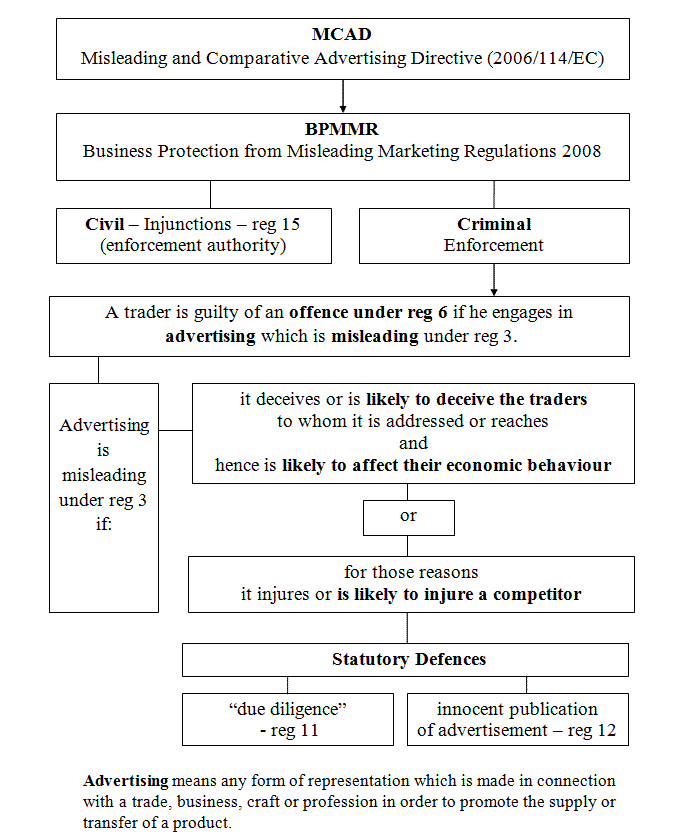Business Protection from Misleading Marketing Regulations 2008 - Condensed
This is a potted version of the BPMMR criminal provisions together with a flow chart. It should NOT be seen as a substitute for referring to the full copy of the Regulations.
 Business
Business
Business Protection from Misleading Marketing Regulations 2008
Key general definitions in reg 2 include:
"advertising" means any form of representation which is made in connection with a trade, business, craft or profession in order to promote the supply or transfer of a product;
"goods" includes ships, aircraft, animals, things attached to land and growing crops;
"premises" includes any place and any stall, vehicle, ship (including any boat and any other description of vessel used in navigation) or aircraft;
"product" means any goods or services and includes immovable property, rights and obligations;
"trader" means any person who is acting for purposes relating to his trade, craft, business or profession and anyone acting in the name of or on behalf of a trader.
Reg 6 Misleading advertising
A trader is guilty of an offence if he engages in advertising which is misleading under reg 3.
Reg 3(2) provides that advertising is misleading which:
(a) in any way, including its presentation, deceives or is likely to deceive the traders to whom it is addressed or whom it reaches and hence is likely to affect their economic behaviour; or
(b) for those reasons, injures or is likely to injure a competitor.
Reg 3(3) provides that in determining whether advertising is misleading, account shall be taken of all its features, and in particular of any information it contains concerning:
(a) the characteristics of the product, including
(4)(a) availability of the product;
(4)(b) nature of the product;
(4)(c) execution of the product;
(4)(d) composition of the product;
(4)(e) method and date of manufacture of the product;
(4)(f) method and date of provision of the product;
(4)(g) fitness for purpose of the product;
(4)(h) uses* of the product;
[*in the CPUTR the equivalent word used is "usage"]
(4)(i) quantity of the product
(4)(j) specification of the product;
(4)(k) geographical or commercial origin of the product;
(4)(l) results to be expected from use of the product; or
(4)(m) results and material features of tests or checks carried out on the product.
(b) the price or manner in which the price is calculated;
(c) the conditions on which the goods are supplied or the services provided; and
(d) the nature, attributes and rights of the advertiser, including
(5)(a) identity;
(5)(b) assets;
(5)(c) qualifications;
(5)(d) ownership of industrial, commercial or intellectual property rights; or
(5)(e) awards and distinctions.
Reg 7 Penalty for offence under reg 6
On summary conviction - maximum of level 5 fine (£5,000).
On indictment – fine and/or maximum of 2 years prison
Reg 8 Offences committed by bodies of persons
Where an offence is committed by a corporate body is proved to have been committed with the consent or connivance of an officer of the body, or to be attributable to any neglect on his part, the officer as well as the corporate body is guilty of the offence and liable to be proceeded against and punished accordingly.
"officer" includes a director, manager, secretary or other similar officer; and a person purporting to act as any such person.
Reg 9 Offence due to the [act or] default of another person
Where a person commits an offence under reg 6 which is due to the act or default of another, that other shall be guilty of the offence (subject to regs 11 or 12) whether or not he is a trader and whether or not his act or default is advertising.
Reg 10 Time limit for prosecution
This is similar to reg 14 CPUTR
Reg 11 Due diligence defence
This is similar to reg 17 CPUTR
Reg 12 Innocent publication of advertisement defence
This is similar to reg 18 CPUTR
Reg 13 Duty to enforce
This is similar to reg 19 CPUTR
Regs 21 to 27, power to make test purchases, powers of entry etc, were revoked by para 112 of Sched 2 to Consumer Rights Act 2015 (Commencement No 3, Transitional Provisions, Savings and Consequential Amendments) Order 2015. For the new variant of such powers see Sched 5 to Consumer Rights Act 2015.
VICTOR SMITH